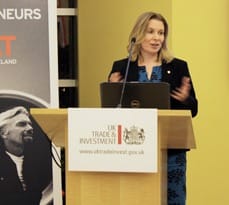Entrepreneurs need to invest in themselves as well as their business to increase the chances of success with their ventures

Entrepreneurs who invest in their own skills as well as in growing their ventures stand a much better chance of succeeding in the long-term, say experts from the Centre for Entrepreneurial Learning (CfEL) at Cambridge Judge Business School, who have inspired and worked with over 16,000 start-ups.
With new research indicating that as many as one in three fail in the first three years, the team is urging anyone thinking about, or already running, their own business to invest in their own skills as the best way to safeguard the future of their venture – and avoid the temptation simply to invest in the business itself.
“Investing in yourself is investing in your business but few entrepreneurs are encouraged to see it like that,” says CfEL Deputy Director Dr Jo Mills. “In fact, they tend to feel guilty when they are spending money on their own development, rather than putting it into their business. With start-up failures potentially even higher than previously thought, it’s really time to throw out the old assumptions that entrepreneurs can ‘wing it’ and learn as they go, and make investment in individual skills a core part of being an entrepreneur.”
Recent research from Harvard revealed that, if failure means investors losing most or all the money they put into the company, then the failure rate for start-ups is 30 to 40 per cent, rising to 90 or 95 per cent if failure is defined as declaring a projected return on investment and then failing to meet it.
So what’s going wrong? One major reason cited by several researchers is lack of managerial experience or an ‘unbalanced’ portfolio of business skills. The Financial Times Guide to Business Start Ups states that 20 per cent of failed businesses would still be in business after 2.5 years if they had sought advice at the outset. All of which indicates that investing in training can make the difference between success or failure. Mills adds:
Even for established entrepreneurs, it’s all about being a better entrepreneur. The more skills you have the less likely your business is to fail and that’s what economies around the world need – not just innovators and entrepreneurs but really skilled innovators and entrepreneurs who know, not just how to create, but how to run a business for the optimum chance of success.
Mills heads up the unique Postgraduate Diploma in Entrepreneurship (PDGE) at Cambridge Judge, which gives students access to the top quality teaching and research offered at the University of Cambridge and either sets them on the entrepreneurial path, or returns them to their businesses with a new skill set, experiences and attitudes designed to transform the way they approach business.
From 2014 the Cambridge PGDE is preparing for growth of the programme to cater to the demand from entrepreneurs who want a professional skillset and an accredited qualification.
The PGDE’s flexible mix of online study with two intensive residential sessions in Cambridge over 12 months means students can continue to work and run their businesses while studying for their Diploma. The programme essentially provides students with an entrepreneurial toolkit, a practical set of skills and business know-how to increase confidence and potential for success while helping to avoid common mistakes. This is underpinned by support from business mentors, inspiration from faculty and access to experienced entrepreneurs (many from the sophisticated Cambridge entrepreneurial ecosystem).
Visiting entrepreneur Lord Karan Bilimoria said:
There’s no doubt that many aspects of successful entrepreneurship can be taught – they are, after all, simply the fundamentals of good business management. And at Cambridge we are also fortunate to be able to offer a unique environment full of entrepreneurs, successful ventures and brilliance in research and learning.
The PGDE harnesses all the resources, knowledge and networks built up by the School’s Centre for Entrepreneurial Learning over 10 years of producing increasingly successful programmes in entrepreneurship and helping aspiring entrepreneurs develop their skills, ideas and innovations.
Dr Hermann Hauser CBE FRS, serial entrepreneur and co-founder of Amadeus Capital Partners, added:
The PGDE is designed to develop entrepreneurial thinking and build the right skills to increase the chances of success. I am often asked whether entrepreneurs can be made. It’s a bit like making a concert pianist. If you’re tone deaf you’re never going to make it; but having a good piano helps a lot. The PGDE is like having a Boesendorfer grand.

